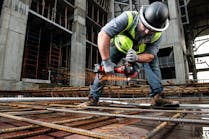Visit nearly any job site and you'll see plenty of rental operation decals on a variety of equipment. The construction rental business is booming — nearly everyone agrees. Or is it? Three professionals who know both the rental and sales markets have different, and similar, viewpoints about the past, present and future of the rent vs. own debate. Want to know why the trend is moving toward renting over owning? Ask an equipment rental specialist. Cary Barrows is the general manager of one of the most successful rental operations in the metropolitan Kansas City area: RSC Equipment Rental, Olathe, Kansas. He has no doubts why contractors prefer to rent. "The cost of owning is more expensive than renting," Barrow declared. "Transportation, maintenance and taxes — they all make renting cheaper than owning." He makes a strong argument. When customers rent from RSC, service and hauling is handled for them. Barrow is relentless: he ticks off the advantages of renting one by one. "If you own it, you have to be able to haul it," he starts. That's especially true with the regional coverage that RSC offers. Area builders can have a piece of equipment delivered from Barrow's operation quicker and easier than they could move a machine from another of their work sites. And if lift equipment is needed farther from home, a local RSC shop can have it working before an owner has loaded it on a flatbed. And with their new satellite communications system, rental delivery is speeded up immensely. The second thing that renting has over owning, according to Barrow, is maintenance. That advantage is two fold: RSC has full-time, skilled service personnel and they keep meticulous records. Not only does the Olathe RSC have trained service staff, they have the tools and parts in their shop. "If you're a contractor, you are not in the business of fixing things," Barrow notes. "We are." They also have a computerized preventive maintenance program. During a lengthy rental, the system identifies when a piece of equipment needs scheduled maintenance and a service vehicle is dispatched to the job site. The contractor doesn't need to call — most of the time, they didn't even know a piece of machinery needed an oil change or greasing. Often, a customer (or an owner) wouldn't even know servicing was needed until the work stops. By then, it's too late. Barrow states the obvious, "Equipment downtime is a big expense." Barrow admits that many contractors prefer to buy, and for good reason. House framers and masons uses lift equipment so much that it pays for them to own. Those machines are an integral of their business, he says. Each reach forklift effectively replaces two or three workers and they don't need to be moved around as much as some equipment. "Reach forklifts live on the job site," he sums up. Patrick Hubbard, president of Halco Construction Equipment, a sales, service and rental operation in Kansas City, Kansas, acknowledges that there is an increasing trend to rent over buy. It just hasn't reached him yet. About 80 percent of his revenue now comes from equipment sales. Looking back 10 to 20 years, rental provided that 80 percent of revenue. As he puts it, "the trend over the last 10 years has moved toward renting, not away from owning." Hubbard agrees that his full-service shop is a big draw for customers — he's spent lots of money on training his shop staff. But he services what he sells as much as what he rents. He also understands the attraction of rental operations like RSC and "chooses not to go head to head with them." Hubbard believes that rental has gained so much ground because a select group of customers choose to rent. A significant portion of his clientele, asphalt pavers and millers, more often than not choose to buy. Hubbard believes there are three main reasons why some types of contractors choose to own rather than rent. The first is the complexity of some equipment. "It might take 20 to 50 hours to train a competent [cold milling machine] operator," he begins. The cost of repairing a miller that an inexperienced operator has just driven over an iron sewer grate is prohibitive. In addition, once you have a skilled operator, you need to keep them on the payroll. With strong service with equipment sales, ownership makes more sense in some situations with some equipment. He uses a personal story to support this argument. "You have a contractor that needs a dirt roller but doesn't use it every day, so he says, 'I'll just rent one.' But some government jobs have very stringent compaction requirements. An untrained worker operating a rented machine probably won't be able to get the proper amount of compaction out of that machine. In that situation, owning the roller might have made more sense." Another factor that makes buying more attractive than renting is the availability of certain kinds of equipment. There are many contractors who specialize in a particular area: like a small-job paving contractor. He limits his jobs to driveways, bike and golf cart trails, residential streets, etc. He stays away from miles and miles of asphalt highway and huge parking lots. Hubbard notes that few companies make a paver that can do a 2-foot walking path up to a 12-foot job (with an extender). That kind of equipment may not be available at most rental operations. Hubbard also remarked that from late fall to early spring, when good weather moves in, every asphalt contractor in the area that doesn't own a paver will rush to the nearest rental center to make the most of a small window of opportunity. Some are not going to find a paver available. The final reason Hubbard gave for the allure of ownership had to do with how a business owner manages his finances. In a discussion better suited to two accountants, he noted that buying equipment was the result of "better balance sheet planning." After a profitable year, Hubbard explained, looking back at your expenses you see that you spent $25,000 renting a skid-steer loader. Now, it is very easy to rent a skid-steer loader. They are available and easy to operate. Protect your profit, he suggests, by buying that skid steer and placing it on your balance sheet. Write the $25,000 cost of a purchased loader off that first year's taxes. Have the asset on your books for trading up on more equipment. Still, Hubbard admits that some business owners "say they don't want to own all that stuff." Halco is first and most a sales operation, but he has a firm rule when a customer is thinking about buying equipment. "I tell them don't purchase anything without talking to their tax guy," he admits. "Sometimes, their accountant will tell them to wait until March before making a purchase. Advice like that binds customers to Halco." Then Hubbard told another of his anecdotes. "There was this mason working on three schools at once, building the walls of masonry blocks. He rented a new concrete pump and I suggested he opt for a rent-to-own option. I told him that if he just paid his bill on time every month, which he would anyway, that at the end of the six-to-eight month rental he would have substantial equity in that pump. So, he trains five guys to run the pump and keeps it till all three schools are done. At that point, he returns the grout-encrusted pump to us. Fine. We clean it up and put it out for rentals. After trying to get the owner on the phone, I finally go to his office and we sit down and talk about the $15,000 in equity he had squandered. He stood by his decision, but finally admitted, 'I did the right thing, but I did it for the wrong reason.' Then he told his secretary that 'the next time Mr. Hubbard comes to the office, make sure you fit him into my schedule.' From then on, he has been a steady customer." Hubbard drove his point home by adding, "You can wring money out of a customer or you can focus on the relationship. Are we in the sales and rental business? No, we're in the relationship business." The third professional that weighed in on the rental vs. own discussion was Lucas Peed, one of the owners of Mid Country Machinery, a Fort Dodge, Iowa, sales, service and rental operation. Like Halco, Mid Country earns about 80 percent of its revenues in sales. He doesn't see a trend toward more rentals. He says that it depends on the contractor. "General contractors travel around a lot," Peed explains, "so they have to rent." They're not going to haul tons of equipment to another state. Local contractors, on the other hand, tend to buy their regularly used equipment and only rent specialty items. Like Hubbard, Peed believes that the type of contractor, rather than the region, influences the rent/buy decision. He thinks that because rental operations are more plentiful now, rental is more of an option. It is not the case, he clarifies, that demand drove the building of more rental shops. "Take lift equipment," Peed begins. "Ten or 15 years ago, they weren't out there. Contractors didn't know they could rent them. Now everyone has one — they found out how useful they are. A lot of folks rent to own. They rent one for a month to find out if its going to work for them, then buy. Now, many deliberately plan on buying when they rent." Peed mirrors Hubbard's belief that no one should make a major equipment purchase, or commit to a long-term rental, without checking with their accountant. "Renting is expensive," he sums up. "Buying comes with appreciation. Some understand that better than others." It seems most believe that rental is up, but more because it is more available now than it was. It is a situation decision, determined on a case-by-case basis. In the end, the decision to rent or buy is determined by the needs of the contractor. None of the three experts talked about the non-tangibles. Caterpillar has solid marketing data that there is still a deeply imbedded pride of owning a CAT among contractors. Still, even they are investing more time and money into rental operations.




